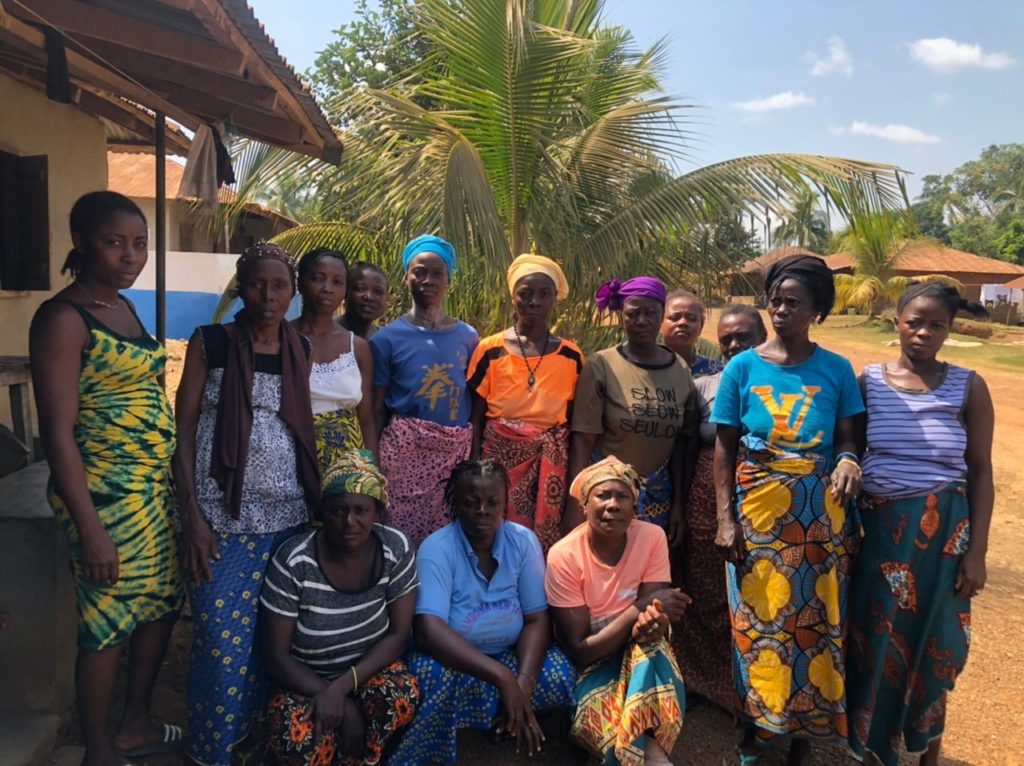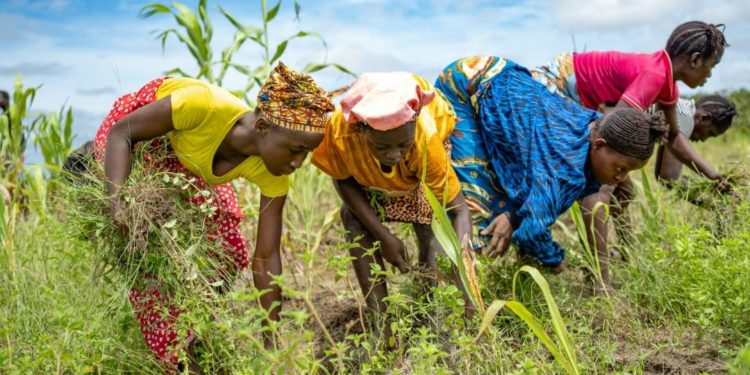By Emma Black
In Rosent Village, Sierra Leone, Mariatu Sesay, a 60-year-old farmer and chairlady, has felt the effects of climate change firsthand, though she does not fully understand the phenomenon. “I don’t know what climate change is,” Mariatu confessed. “All my life, I’ve been farming.
The weather has changed, but no one has explained why.” Mariatu, a mother of seven with no formal education, is one of many rural farmers in Sierra Leone grappling with erratic weather patterns.
She shared how organizations working in her area have focused on discouraging deforestation without providing sufficient education about climate change. “They tell us to stop cutting down trees, but they don’t explain why or how it affects us,” she said, traditionally, her family has relied on farming techniques passed down through generations. “Our fathers used to cut trees to build houses and clear land for farming, and their crops grew well,” Mariatu explained. “Now, the rains come late, the heat is unbearable, and our rice and groundnuts don’t grow as they used to.
“This year, I planted 60 cups of groundnuts, and they didn’t grow at all.” to cope, Mariatu has taken loans from traders and microcredit schemes to support her children’s education and household needs. yet, like many women farmers in Sierra Leone, she lacks access to climate-smart agricultural knowledge and resources to adapt to changing weather patterns.
Women farmers make up a significant portion of Sierra Leone’s agricultural workforce but face unique challenges. Many, like Mariatu, are still reliant on traditional methods and have limited exposure to modern farming techniques. In the North and Central regions of Sierra Leone, 90% of women farmers continue to use outdated practices, leaving them vulnerable to the increasing impacts of climate change.
In Kenema district, however, there is hope. Farmer Martha Kallon shared how the Sierra Leone Environmental Matters (SLEM) initiative has helped her adapt. “After my husband passed away, I struggled to secure farmland,” Martha said.“SLEM’s founder, John Kamara, intervened and helped me get land from my in-laws and family.”
Through SLEM, Martha learned new farming techniques, such as cultivating drought-resistant crops and improving soil fertility. “This training has been a game-changer for me,” she said.
Despite efforts by organizations like SLEM, many women farmers remain disadvantaged. Limited access to land, credit, and modern farming tools exacerbates the effects of climate change. Cultural and systemic gender barriers further hinder their ability to adapt, while the burden of caregiving and water collection reduces the time women can dedicate to farming.
John Kamara the founder of Sierra Leone Environmental Matters {SLEM} emphasized the commitment to supporting women farmers in Kenema. “We focus on sustainable practices like agroforestry, organic farming, and soil conservation, and we also promote alternative income-generating activities, such as eco-tourism and renewable energy, to reduce reliance on deforestation,” Kamara explained.
He also highlighted SLEM’s role in empowering women through decision-making participation and agroforestry projects. “Women are critical to our efforts, but they face enormous challenges. We must strengthen their land rights, expand access to microcredit, and equip them with climate-smart technologies,” Kamara said.

The government of Sierra Leone is working to build climate resilience through the Ministry of Agriculture and Food Security (MAFS). According to Christna Scott, Public Relations Officer at the ministry, the National Agricultural Transformation Plan (NAT 2023–2027) and the Feed Salone initiative aim to integrate climate-smart agricultural (CSA) practices.
“We want to enhance the adaptive capacity of farmers, increase agricultural productivity, and strengthen food security,” Scott explained, he said the ministry hads been providing hands-on training in CSA techniques, and restoring degraded lands and integrating trees into farming systems, we are focusing on adaptive techniques like water harvesting, soil fertility management, and organic farming.
Scott emphasized the government’s partnerships with organizations like FAO, WFP, and the African Development Bank to promote CSA practices. “We collaborate with NGOs and traditional leaders to improve women’s access to land, credit, and resources. Women are vital to achieving sustainable agriculture and food security in Sierra Leone,” he said.
At COP27, Sierra Leone government advocated for global support to empower women farmers, the government highlighted how unpredictable weather patterns and natural disasters disproportionately affect women, who are central to the country’s food production, despite the challenges, women farmers like Mariatu and Martha are resilient, with increased investment in education, climate-smart technologies, and policies that address systemic gender barriers, Sierra Leone’s women farmers can become powerful agents of change in the fight against climate change, until today not much has been done to improve the food challenges in the country
At COP27 (held in Sharm El-Sheikh, Egypt, in November 2022), the President of Sierra Leone, Julius Maada Bio, emphasized the country’s vulnerabilities to climate change and its commitment to addressing these challenges through sustainable policies and international collaboration, the president Bio called for increased international climate financing to support Sierra Leone and other vulnerable nations in adapting to the adverse impacts of climate change.
The author, Mr. John Kamara, is a member of the Sierra Leone Environmental Matters (SLEM) Kenema District Tel: +61 413 340 396






















